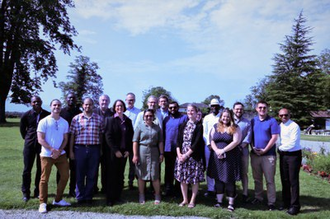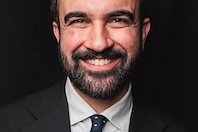Switzerland: Interreligious summer school

Bossey students
Source: World Council of Churches
Young students from all over the world were welcomed to the World Council of Churches (WCC) Ecumenical Institute in Bossey, Switzerland, on Tuesday as part of their residential studies for the Certificate of Advanced Studies in Interreligious Studies. The course for 20-35 year-olds involves a study period of 6 weeks (3 weeks distance learning, 3 weeks residential). The residential period includes lectures, courses, workshops and study visits to places of interreligious interest.
The course brings together students from the three Abrahamic religions to learn more about each other's religions and enhance their understanding of today's multicultural society. The theme of the 2019 interreligious summer course is 'Engaging for just and participatory societies - Belongingness in Judaism, Christianity and Islam', chosen to address the vital question of the role of religions in society today. People of faith build community so that people from different backgrounds find home and belonging, and at the same time they have a public role and function through which they contribute to society as a whole.
The programme has been set up by an international group of Jews, Christians and Muslims, both within the student body, as well as the teaching body. Courses are conducted by professors of the Ecumenical Institute, and experts of the World Council of Churches in collaboration with the Autonomous Faculty of Protestant Theology of the University of Geneva, and Jewish and Muslim partners.
The students were welcomed by the dean, Fr Prof Lawrence Iwuamadi and Fr Prof. Dr Ioan Sauca, director of the WCC Ecumenical Institute and deputy general secretary of the WCC. Sauca encouraged participants to engage in "a dialogue of identities" and to reflect on "what we can do together as people of different faiths to create a society where we live peacefully side by side". He proudly mentioned that it has been 12 years since interreligious studies started at the Ecumenical Institute. The course has provided formation for over 230 participants to date.
Mutual respect is a very important aspect, according to Eric Ackermann, officiating minister of the Great Synagogue of Geneva and president of the interreligious platform in Geneva. He said: "We are here to discover our common humanity, without losing our particular identities, and to respect each other for how we are and what we stand for. We all have treasures in our own respective religions which become clearer and are easier to appreciate when we engage in dialogue with one another".
The World Council of Churches promotes Christian unity in faith, witness and service for a just and peaceful world. An ecumenical fellowship of churches founded in 1948, today the WCC brings together 350 Protestant, Orthodox, Anglican and other churches representing more than 550 million Christians in over 120 countries, and works cooperatively with the Roman Catholic Church. The WCC general secretary is the Rev. Dr Olav Fykse Tveit, from the [Lutheran] Church of Norway.

















